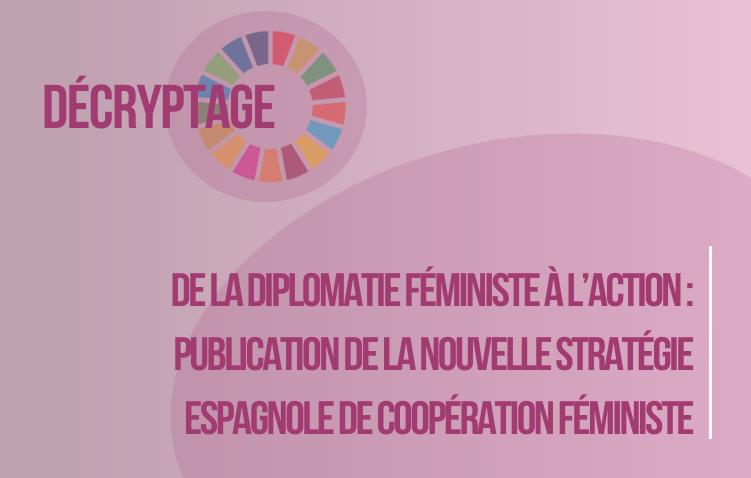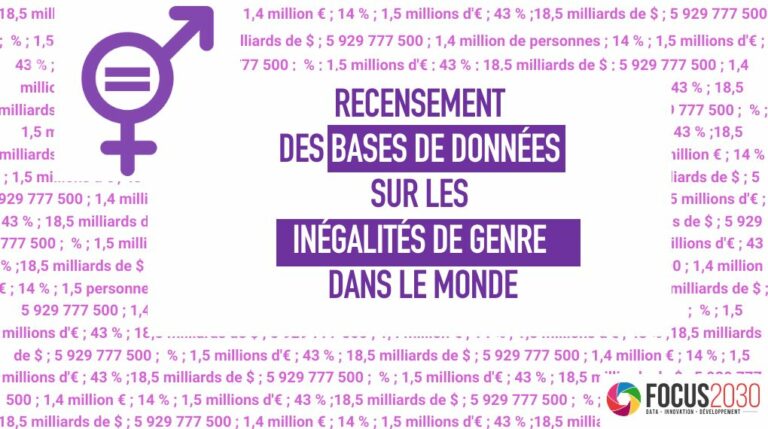Sexual and reproductive health and rights: global overview and French strategy
Publié le 01/03/2024, modifié le 05/03/2024.
|
Special edition on the state of gender inequality around the world in 2025 : This overview focusing on the overview of sexual and reproductive health and rights (SRHR) worldwide is one of the components of a special report dedicated to gender inequalities in the world in 2025. |
Sexual and reproductive health and rights (SRHR) are regarded as critical components of women’s empowerment and sustainable development by many feminist and civil society organizations. Improving access to SRHR for women and girls is central to the achievement of universal health coverage, and a key issue in reaching the Sustainable Development Goals.
SRHR cover three main issues : human rights and individual freedoms, gender equality and the sustainable development of societies, and public health. The latest stage in the definition of SRHR was the opening up of these rights to lesbian, gay, bisexual and transgender + (LGBT+) people in the 1990s.
Despite progress over the past two decades, major challenges remain, and greater financial mobilization and awareness on the part of the international community are required to meet current needs. To meet these challenges, France launched in 2023 a new international strategy for SRHR for the period 2023-2027.
What are SRHR ?
Sexual and reproductive health and rights (SRHR) refer to the set of rights guaranteeing individuals the right to control their own bodies and freely make all decisions relating to sexuality and reproduction. They are therefore not limited to the field of maternal health alone, and cover other fundamental aspects such as information and education on sexuality, access to contraception, prevention and screening for sexually transmitted diseases, and so on.
According to the UNFPA’s Background document for the Nairobi summit on the 25th anniversary of the International Conference on Population and Development (ICPD25), “Good sexual and reproductive health is a state of complete physical, mental and social well- being in all matters relating to sexuality and the reproductive system. All individuals have a right to make decisions governing their body and to access services that support that right. Every individual has the right to make his or her own choices about his or her sexual and reproductive health, which implies that people should be able to have a satisfying and safe sex life, the capability to reproduce and the freedom to decide if, when and how often to do so”.
Over 30 years of progress…
Over the past three decades, significant advances have been made in the SRHR landscape.
The “Cairo Programme” adopted in 1994 at the International Conference on Population and Development (ICPD), and the Beijing Conference on Women in 1995, marked a decisive turning point in the recognition of SRHR. A new approach based on human rights led to significant progress in the field of women’s health in the following decades. Between 2000 and 2023, for example, the maternal mortality rate fell by around 40% worldwide.
SRHR are largely addressed, too, in the “Agenda 2030” and its 17 Sustainable Development Goals (SDGs), adopted in September 2015 by the 193 member states of the United Nations. Indeed the specific issue of SRHR appears both in the context of SDG 5, which aims to “Achieve gender equality and empower all women and girls” (target 5.6), and SDG 3 – “Ensure healthy lives and promote well-being for all at all ages” (target 3.7).
In 2021, SRHR also received increased attention at the Generation Equality Forum, organized by UN Women and the governments of France and Mexico. On this occasion, governments, NGOs and international organizations drew up a Global Acceleration Plan for Gender Equality, including a series of actions and commitments in particular in favor of bodily autonomy and SRHR.
But there are still considerable needs to be met
Despite these advances, major challenges remain. The rise of conservatism and anti-choice movements jeopardizes the gains made, while humanitarian, climatic and health crises often relegate them to the background. In particular, the Covid-19 pandemic has had a devastating impact on the progress made, disrupting essential health services worldwide and particularly affecting women.
- In 2024, 61% of women of reproductive age – over 1.2 billion – are living in countries with restrictive abortion legislation. These restrictions have a major impact on women’s lives : every year, the WHO estimates that 39,000 women die as a result of unsafe abortions.
- 800 women die every day worldwide from complications related to pregnancy or childbirth
- 270 million women worldwide have no access to modern contraception
- More than 12,000 girls are at risk of female genital mutilation every day
Funding for SRHR remain scarce
A major challenge lies in the lack of dedicated funding for SRHR, which hinders the implementation of effective programs and jeopardizes the achievement of the ambitious goals set.
According to OECD data, aid volumes integrating gender equality issues have increased tenfold since 2002, reaching 74.9 billion dollars in 2023 Yet, amounts allocated to reproductive rights and health dropped by 27% in 2023 compared to 2022, according to the report Donors Delivering for SRHR 2025 by the Deutsche Stiftung Weltbevölkerung (DSW).
Furthermore, only 4.3 % of the total bilateral ODA from the OECD Development Assistance Committee (DAC) countries was dedicated to SRHR in 2023, amounting to 10.77 billion dollars. In the same year, France allocated 3.28 % of its ODA to SRHR, compared to 9.35 % for the United States, 6.15 % for Luxembourg, and 6.06 % for the Netherlands .
In January 2020, the United States reinstated the Global Gag Rule (also known as the Mexico City Policy). This measure suspends U.S. aid to foreign organizations that support access to abortion, regardless of the legal framework in the countries where they operate or their other sources of funding.
According to the Guttmacher Institute, the suspension of this aid may already have deprived 11.7 million women and girls of access to contraceptives, led to 4.2 million unintended pregnancies, and caused over 8,000 deaths due to complications during pregnancy or childbirth.
The Donors Delivering report reveals that the halt in funding — notably for programs such as those of UNFPA — combined with the closure of USAID, has caused supply disruptions of contraceptives, antiretrovirals, and treatments for sexually transmitted infections in several low- and middle-income countries, thus affecting access to care.
Focus on France’s international strategy for sexual and reproductive health and rights (2023-2027)
The Generation Equality Forum, hosted by France in Paris in 2021, in co-presidency with Mexico and under the aegis of UN Women, launched six Action Coalitions, including the Action Coalition on Sexual and Reproductive Health and Rights. To this end, France has pledged 400 million euros in support of SRHR between 2021 and 2025, notably via the Supplies program of the United Nations Population Fund (UNFPA) and support for the Organization for Dialogue on Safe Abortion (ODAS) center in West Africa.
In 2016, the Ministry of Europe and Foreign Affairs unveiled the first Strategy on France’s External Action on Population, Sexual and Reproductive Health and Rights Issues 2016-2020, in support of the implementation of the Cairo Programme of Action (1994). In 2023, France announces the launch of its new International Strategy on Sexual and Reproductive Health and Rights 2023-2027.
Three key changes distinguish France’s International Strategy on SRHR from its predecessor : a rights-centered approach, putting individuals at the heart of the strategy ; six thematic priorities guiding France’s action ; and recognition of SRHR as a cornerstone of French feminist diplomacy.
Les six priorités thématiques de la stratégie :
- Access to safe abortion
- Fight against sexual and gender-based violence
- Comprehensive sexuality education
- Transformation of masculinities
- Equality and access to rights for LGBT+ people
- Protecting SRHR in times of crisis
Through this strategy, France is committed to meeting the financial obligations agreed at the Generation Equality Forum. It also aims to increase its advocacy efforts in favor of SRHR on an international scale, even in contexts of crisis and conflict. In addition, it plans to strengthen its multi-stakeholder partnerships and communicate these ambitions to all its foreign policy stakeholders.
Despite this progress in promoting SRHR around the world, the funding allocated to this issue and France’s political commitment to it remain limited. For example, by suspending its financial aid to the UN agency for Palestinian refugees (UNRWA), France is disengaging from initiatives to combat gender-based and sexual violence and the lack of access to SRHR for women in Gaza. According to the latest available data, France ranks 16th out of the 30 OECD Development Assistance Committee countries that fund SRHR worldwide.
Furthermore, the austerity plan adopted by France in February 2024, announcing a reduction of 742 million euros allocated to official development aid, greatly weakens this feminist ambition, and the promotion of SRHR, raising questions about a potential a gap between France’s rhetoric to promote gender equality and SRHR and the financial efforts actually disbursed as part of its development aid.











